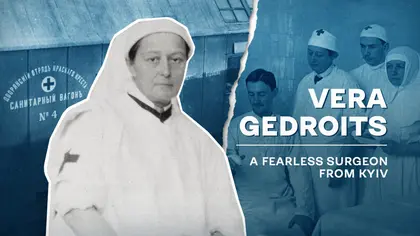VERA IGNATIEVNA GEDROITS was a physician, a doctor of medicine, one of the world’s fi rst female professors of surgery, and the fi rst person in the world to perform abdominal surgery on the battlefi eld. She was called the George Sand of Tsarskoye Selo, or, thanks to the poet of the Silver Age Nikolay Gumilyov, “our Sappho”.
THE PRINCESS WHO SAVED THE JAPANESE PRINCE
In the middle of the nineteenth century, Vera’s grandfather, a member of the Lithuanian noble Giedroyć family, was accused of rebellion against the royal throne and was executed. His son (Vera’s father Ignatiy) was forced to flee to Samara Province where he called himself just Gnat. His daughter also got in political trouble. She was expelled from the gymnasium for writing satirical epigrams when she was 13 years old (1883). Her father had to arrange for her to study under a local paramedic, obviously he had no clue back then that medicine was going to become Vera’s whole life work. She participated in student revolutionary movements. The police kept an eye on her. She moved to Switzerland in the mid-1890s because women were not eligible for higher education in the Russian empire. 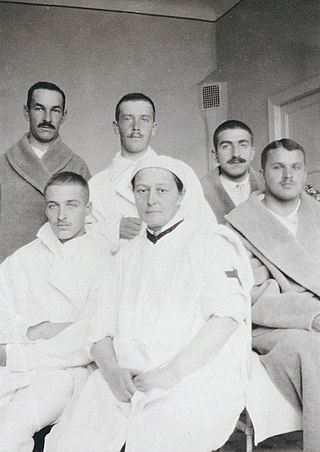
Vera with her patients during the World War I, around 1915.
After Gedroits acquired the profession of a surgeon, she volunteered twice to go to the front: during the RussoJapanese War (1904-1905) and World War I (1914-1918), where she became a divisional surgeon (a rank comparable to lieutenant colonel) thanks to her courage and skills. During the Russo-Japanese War a Japanese prince who was one of the younger members of the imperial family (unfortunately, the history did not convey his name to us) ended up in the hands of the Russians, heavily injured. The prisoner was hospitalized. Ms. Vera operated on him. She handled this task brilliantly. Soon after, the prince returned to Japan, alive and well. He subsequently sent a letter of thanks to the Emperor Nicholas II, where he also referred to “Gedroits with the hands of a healer who brought his life back.” Vera Ignatievna received valuable Netsuke miniature sculptures and a hand-embroidered Japanese panel as gifts.
A DECADE AHEAD OF EUROPE
A decade ahead of Europe: a British writer John Bennett highlighted this when he studied the biography of this “unique surgeon” from Ukraine. He wrote: “We in the West realized that Gedroits was the first in the history of medicine to begin to perform abdominal surgeries, not in the silence of hospital operating rooms, but directly in the theater of war… At that time in Europe, we simply left people wounded in the abdomen without any help. It has taken other European countries decades to master the technique that Princess Vera developed on her own, without anyone’s advice and in incredibly difficult conditions.”
A “MITTEN” FOR GUMILYOV AND A BALL FOR HERSELF
This surgeon had courage not only on the battlefield and in the operating room. In her personal life, Vera Gedroits was also special. This quote is from the memoirs of her friend, the artist Irina Avdiyeva: “She was big, a bit fat, and dressed in a manly way. She wore a jacket and a tie, men’s hats, a fur coat with a beaver collar. She cut her hair short. She talked about herself in the masculine gender: I left. I operated. I said.” (Note: Verbs in the past tense in the Ukrainian and Russian languages have different endings for masculine and feminine genders). The Oxford professor Catriona Kelly has suggested Vera Ignatievna’s probable transsexuality. She wrote about it in her study, “A History of Russian Women’s Writing” (Oxford University Press, 1994), citing Gedroits herself, who wrote: “I decided to become my brother after his death.” Researchers consider her marriage with Captain Nikolai Belozerov to be fictitious, concluded for the sake of a passport and a new last name, which made it possible to legally evade her status as someone under police surveillance and study in Europe. Among the men to whom Vera turned down was the famous poet Nikolay Gumilyov. He was so upset when he heard a firm “no” from Gedroits that he wrote a poem dedicated to her, “To a Cruel One”.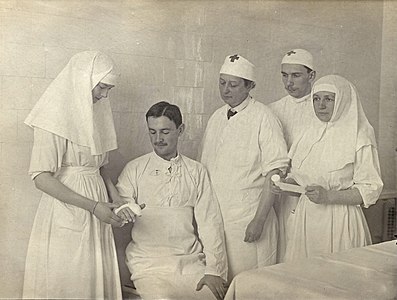
Gedroits is watching the daughter of the Emperor Tatiana bandaging an infantry officer. Tsarskoye Selo, 1916.
It is known for certain that there were mutual strong feelings between Vera and a woman named Ricky Gudi she met in Lausanne, where Gedroits studied and later started working in the late 1890s. However, in 1898, she received a letter from her father who told her that her sister Alexandra had died and that her mother was suffering from nervous exhaustion: “I have never called on you, but it is a necessity. Finish your service and come home. Seven miles away from us, a new plant is being built, they need a surgeon, and I will put in a good word.”
Vera had to leave. She made an agreement with her girlfriend that she would follow her to Russia. Later, however, a sad letter came from Ricky: “Don’t wait, I want to rush to see you, but I can’t leave my children and my job. Breaking my own, and probably your life as well, I must fulfill the obligation that laid a burden on our shoulders. Believe me, I suffer so much!” After reading this, Gedroits shot herself with a pistol – but her colleagues saved her. After having recovered and moving to Kyiv, Vera lived with an ex-maid-of-honor at the imperial court for 15 years, the Countess Maria Nirod. Maria, after the death of her partner, would join a convent and outlive Gedroits by 33 years.
INTERESTING FACTS
- There are contradictions in Ukrainian language sources regarding spelling our protagonist’s name: Гедройць (with a soft sign in the end). But according to Ukrainian spelling, Гедройц is still correct (without a soft sign).
- Except for this student from Kyiv who received the highest marks in her final examinations, only two other women attended the Faculty of Medicine at the University of Lausanne.
- In Kyiv, she lived in the apartment No. 25 at 7a Kruhlouniversitetska Street.
- On July 27, 1905, she came up with what was a sensational idea at the time: “The closer the hospital is to the theater of operations, the more effective it is.”
- The writer Nataliia Vorontsova Yuryeva published the book about the adventurous life of the Kyiv born woman: “Vera Gedroits: Princess, Genius-Surgeon, Lesbian”.
- From the War Office’s Report on the Russo-Japanese War, issued in 1906 by the Military Service in London: “Among those who went to the Front in the service of the Red Cross as surgeons [was] the Princess Gedroits, the chief surgeon of the hospital train furnished by the association of Russian nobility, who was always at the front, operating in a specially constructed train car, till the enemy’s fire threatened the train.”
- Gedroits had talent in literature. She is the author of a number of books, including “Chinese Tales” (1913), “Galician Stories” (1918), “The Little Caftan” (1930), “The Pole” (1931), and her adventurous memoirs “Life”.
- The literary pen name of Vera was Sergei Gedroits, in honor of her deceased brother.
- The Archbishop Ermogen wished to be buried next to Gedroits, who at one time saved the priest from death.
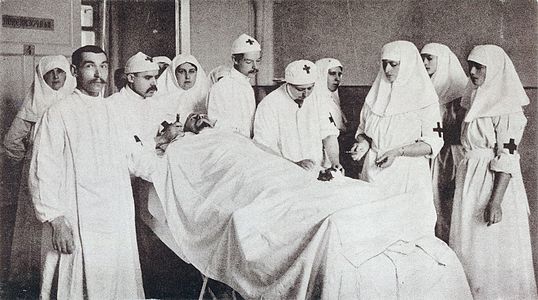
The Empress Alexandra Feodorovna hands instruments to Vera Gedroits during surgery.
FROM THE DOSSIER OF VERA GEDROITS
• Vera Gedroits falsified her biography by indicating Kyiv as her birthplace. In fact, she was born in the village of Slobodishche near Bryansk on April 7, 1870.
• She studied at the Bryansk Women ‘s High School, attended Peter Lesgaft’ s courses in St. Petersburg, and graduated from the Faculty of Medicine at the University of Lausanne.
• She was the household doctor of the royal family, a surgeon of the 6th Siberian Rifle Regiment, the doctor at one of the Kyiv children’s clinics, and a teacher at the Kyiv Medical Institute. She was also Head of the Society of Doctors of Advanced Noble Medical Units.
• After the 1917 revolution, she stayed in Kyiv. She worked at the children’s hospital, at the Kyiv Medical Institute Surgical Clinic (as a private associate professor of the department). In 1923 she was appointed a professor of medicine.
• During the last years of her life, she was left without a formal job: she was removed from university and denied a pension. But Gedroits continued to operate in the hospital at the Pokrovsky Monastery in Kyiv.
• She died in Kyiv in March 1932 from cancer.
APHORISM ON THE TOPIC: “Medicine is love, otherwise it is worthless”, - Paul de Kruif.
JOIN US ON TELEGRAM
Follow our coverage of the war on the @Kyivpost_official.
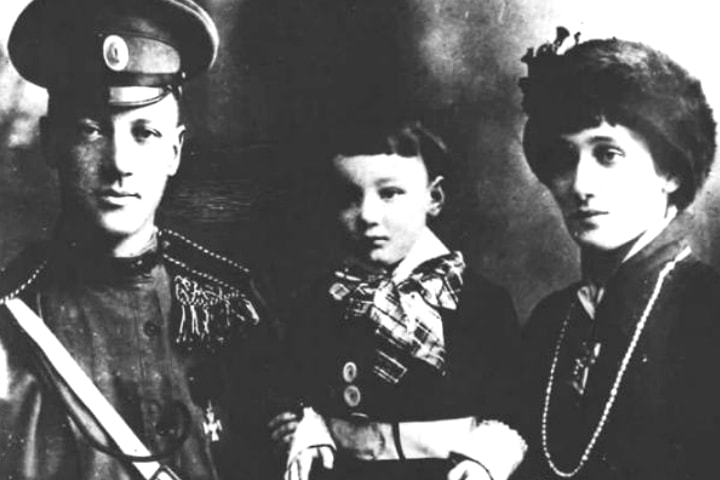
The married poets Nikolay Gumilyov and Anna Akhmatova (pictured with their son) were friends with Gedroits.
This article by Nadiia Avramchuk and Mykola Sukhomozsky is reprinted with the publisher's permission from the book (UN)Celebrated Ukrainians Who Changed the Course of History, SAMIT-KNYHA, Kyiv, 2020.
You can also highlight the text and press Ctrl + Enter


